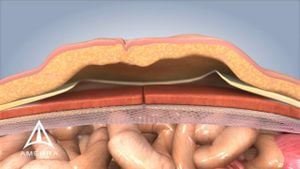ASHEVILLE, N.C. (WLOS) — President Donald Trump embarked on his first visit to western North Carolina since assuming office for his second, non-consecutive term, with the intent of addressing the recovery efforts following the devastation of Hurricane Helene. The storm ravaged communities across the region, and many residents continue to grapple with extensive damage months later.
Arriving on January 24, 2025, Trump was greeted by supporters and local officials at Asheville Regional Airport, where he was joined by his wife, First Lady Melania Trump, and several key figures including North Carolina Governor Josh Stein and various Congressional representatives.
The President’s agenda focused squarely on assessing the region’s recovery operations. "I’m very concerned about the aftermath of Hurricane Helene, which hit hard here on September 27, 2024. Much of this area is still struggling to rebuild," he stated during his visit.
At around 11:30 AM, after receiving briefings from emergency responders about the disaster's impact, Trump met with families who had suffered severe losses. Among them was Thomas Bright, who described his harrowing escape from his flood-damaged home, explaining, "We didn’t think we were going to make it at all. I spent hours on the roof writing farewell notes to my children as debris floated past." Such moving accounts underscored the urgency of the community’s need for assistance.
Trump’s visit coincided with Governor Stein’s concerns about the Federal Emergency Management Agency (FEMA), which has drawn criticisms over its performance during the recovery from Helene. Stein had previously emphasized the importance of the federal government’s commitment to support this beleaguered state. "I want to thank him for traveling to North Carolina to witness the damage firsthand. Our citizens need help, and we hope today marks the beginning of renewed federal support," he remarked.
During the tour, Trump proposed sweeping reforms to FEMA, even hinting at the possibility of abolishing the agency altogether. "FEMA has turned out to be a disaster," he warned, asserting, "I think we’re going to recommend eliminating it. We should send money directly to the states instead of funnelling it through this very bureaucratic system." His call for restructuring the federal disaster response was met with mixed reactions from locals.
Following Trump’s remarks, resident Mona Nix-Roper recounted her terrifying experience during the hurricane, stating, "It’s just heartbreaking. My house became an island surrounded by floodwaters, and I had to rely on my son to rescue me when it became too dangerous to stay." Nix-Roper's story highlighted not only the physical but also the emotional toll the hurricane has taken on families.
Congressman Chuck Edwards, who has been actively engaged with Trump, voiced his support for the President’s initiatives, saying, "President Trump made this his first official trip outside the capital to keep his promise to the people of Western North Carolina. We are not forgotten." Edwards has been advocating for increased federal disaster relief funding, indicating the local government has appropriated $110 billion to assist recovery efforts.
Despite the concerns raised about FEMA, some residents expressed gratitude for the federal assistance already provided. Around $319 million has been distributed to aid recovery, which has been helpful for some, but not enough for many who feel abandoned. "I’ve seen people stepping up and extending help, but there are still too many of us struggling without power or homes. If anybody can do something about it, I think he can," remarked Laurie Carpenter, benefiting from community aid initiatives.
After engaging with more families, Trump continued to reinforce his commitment to helping them rebuild their lives, stating emphatically, "You are not forgotten any longer. You were treated very badly by the previous administration. Under my leadership, we are committed to making this right." This sentiment reverberated through the crowd, who expressed appreciation for his visit.
Despite his criticisms of FEMA, Trump also encountered skepticism. Residents like Sarah Wells Rolland, whose pottery studio was destroyed by flooding, voiced their concerns. "I’m not overly optimistic. I wonder if we will see long-term assistance," she confessed, showcasing the uncertainty many still feel.
The visit concluded with Trump promising substantial federal funding to restore the area and complete recovery efforts: "We’re going to supply the money, and we’re going to fix it as fast as we can." He emphasized the urgency of the situation before departing for his next destination, underscoring the heightened expectations surrounding federal support for the beleaguered state.
Trump's trip highlights the need for sustained federal engagement in disaster recovery and reflects both the optimism and skepticism of residents still wrestling with the aftermath of Hurricane Helene. Observers continue to monitor how his proposals will affect local recovery and whether promises made will translate to tangible assistance for those affected.



